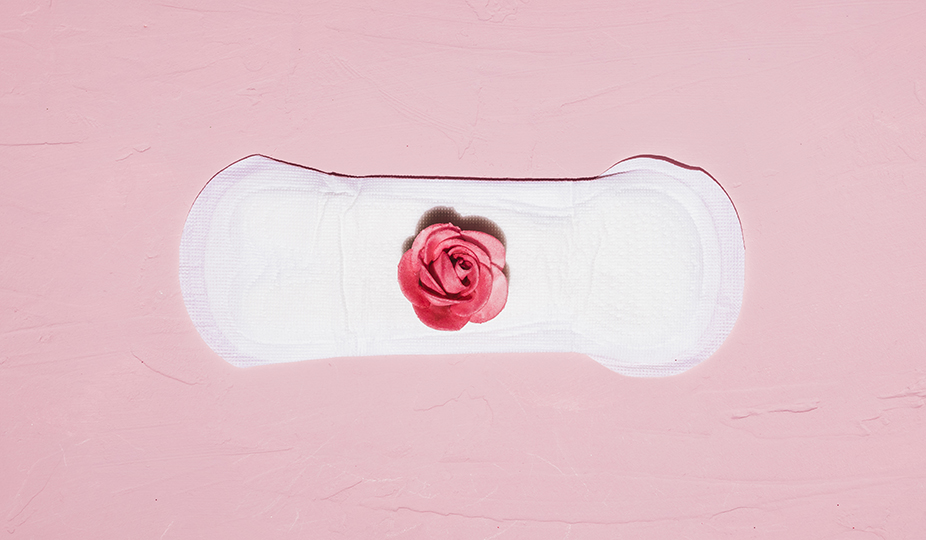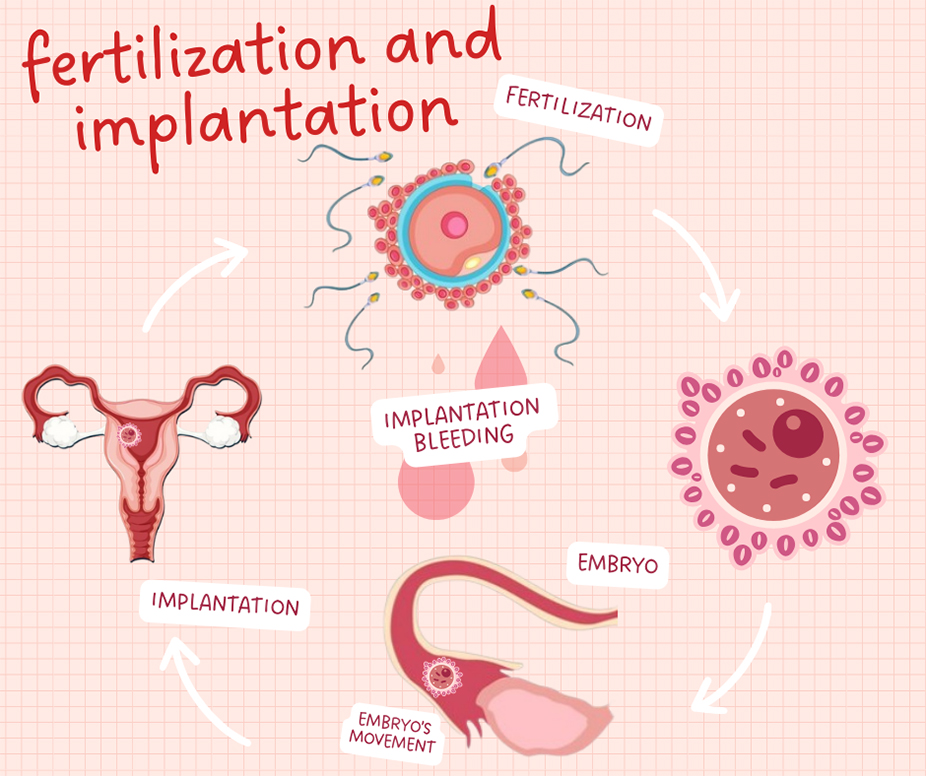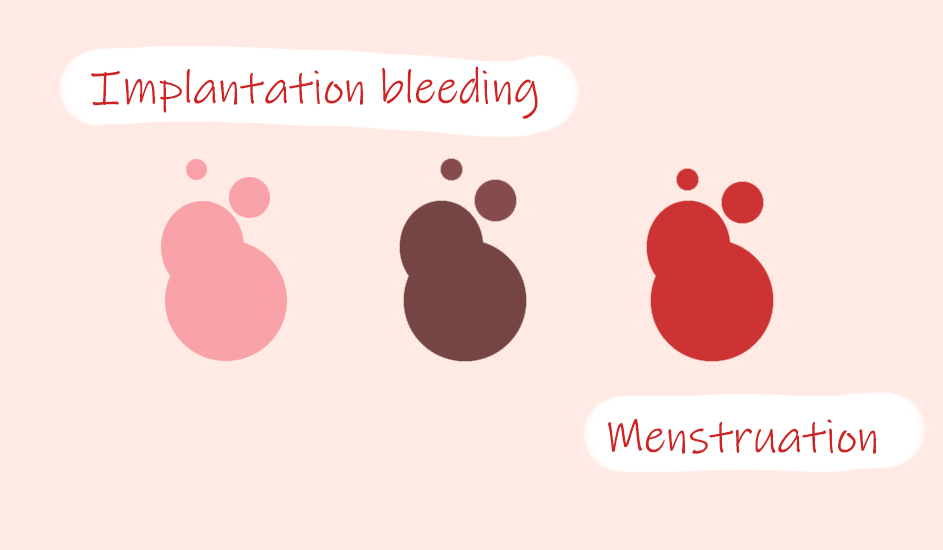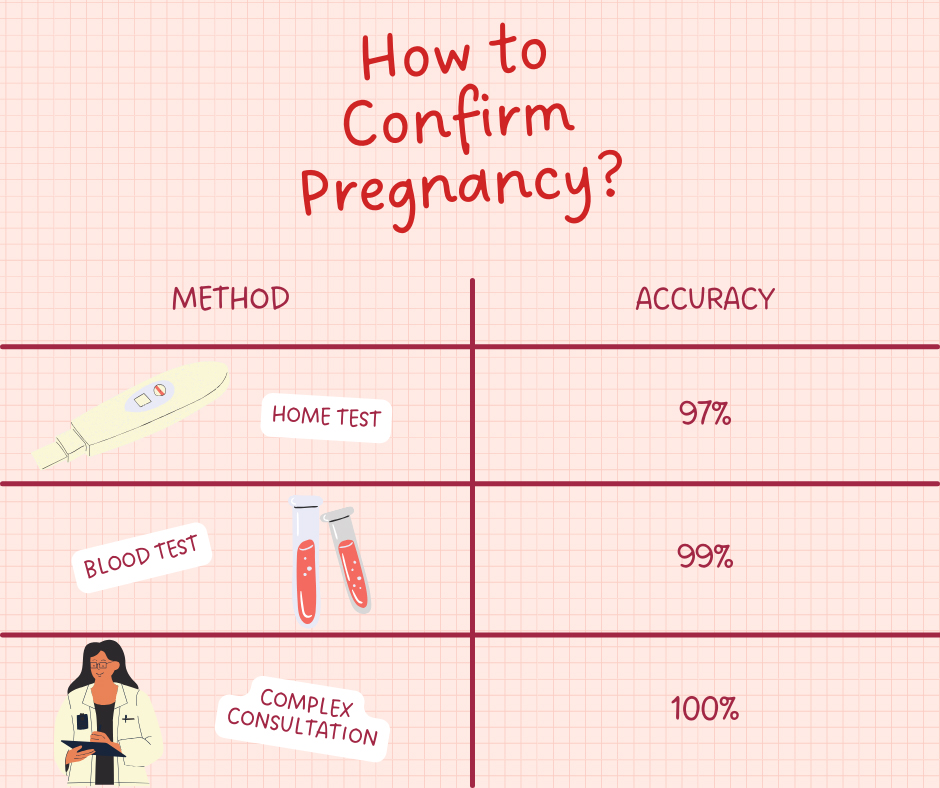IVF Implantation Bleeding – Is Spotting after Embryo Transfer Normal?
Implantation bleeding is quite common and occurs in 25% of pregnant women. Around 10-14 days after natural conception or IVF embryo transfer, the fertilized egg attaches to the uterine lining and causes scanty bloody spotting or light bleeding. Women experience this discharge 4 to 2 days before expected menstruation. It usually does not require medical treatment and gives positive signs about a successful pregnancy.

However, some women could have concerns about the reasons, intensity, amount, and risks that the bleeding could have on the pregnancy. Let’s find out why it happens, which symptoms are normal on days 1-12, and how to differentiate it from your period.
Why Does Spotting Happen After Embryo Transfer?
Light bleeding is not always a bad sign, indicating a reproductive system disease. On the contrary, it can be the first symptom of a pregnancy.
The way it works is as follows. The fusion of an egg and sperm forms an embryo. It needs a favorable environment for successful growth, so it travels through the fallopian tubes to the uterine mucosa – the endometrium. This organ is ready to meet the embryo and is a dense fusion of blood vessels, veins, and arteries to ensure healthy baby development. The embryo’s task is to attach itself closely to the endometrial tissue to draw oxygen. To do this, it ruptures capillaries to form new ones that will serve as a source of nutrition. It is the reason for bleeding.

Implantation Bleeding Symptoms
Despite the long process of embryo implantation, women begin to feel the first signs around days 4-6 after conception or IVF transfer. At the same time, some patients are asymptomatic. Moreover, 75% of women do not experience bleeding at all. All these cases are variants of the norm.
Those who experience bleeding describe it with these symptoms:
- mood swings;
- mild cramps that are less intense than during regular periods;
- abdominal bloating;
- nausea and vomiting;
- dizziness;
- breast engorgement;
- backaches.
Remember that spotting after implantation does not bring severe pain and discomfort. If you observe profuse bleeding with severe spasms, you should immediately consult your doctor.
Symptoms Day-by-Day
Symptoms after IVF transfer, IUI, or natural insemination appear gradually. Let’s analyze the manifestations by days after conception to track and clearly understand the state of the body.
Days 1-3
During the natural conception, a fertilized egg moves through the fallopian tubes. This process is unnoticeable and asymptomatic.
Days 4-6
During this period, the naturally formed or transferred with IVF blastocyst implants in the uterine mucosa. It provokes mild pelvic cramps. Often, patients stress out by mistaking the tingling for menstruation and IVF failure. However, it is not worth worry as mild cramps may be a positive sign of pregnancy onset.
Days 7-10
In a week, most women notice pink or brown-colored bloody discharge, i.e. spotting. Also, these days are rich in accompanying symptoms, here are some of them.
- Abdominal bloating. It is a fairly common sign, especially in IVF. The fact is that IVF drugs stimulate the ovaries and lead to their enlargement. As a result, women can feel abdominal bloating.
- Nausea. Many women experience nausea during implantation. It is one of the first warning signs of conception. Nausea is caused by human chorionic gonadotropin hormone (hCG) level increase and is often more pronounced in the morning. In some cases, it leads to vomiting.
- Dizziness. Pregnancy is a period of great stress on the woman’s body. It includes changes in the hormonal background and blood circulation. It results in lower blood pressure, dizziness, weakness, and headaches.
- Breast swelling. The hormones estrogen and progesterone prepare the mammary glands to breastfeed the baby and produce milk. Because of this, the breasts may hurt and become more sensitive.
- Lower back pain. The uterus enlarges to accommodate the growing fetus. As a result, there is stretching of the ligaments and discomfort in the lower back.
Days 11-12
Symptoms may persist even if the spotting has stopped.
Note that these signs are not 100% indicators of pregnancy. Take a blood test for hCG levels to confirm it.
| Days | Symptoms | Intensity | Common in Pregnant Women |
|---|---|---|---|
| 1-3 | No noticeable symptoms | - | - |
| 4-6 | Mild pelvic cramps | Low to Moderate | Common |
| 7-10 | Pink or brown colored spotting | Moderate | Common |
| 7-10 | Abdominal bloating | Low to Moderate | Common |
| 7-10 | Nausea | Low to Moderate | Common |
| 7-10 | Dizziness | Low to Moderate | Common |
| 7-10 | Breast enlargement | Low to Moderate | Rare |
| 7-10 | Vomit | Low | Rare |
| 7-10 | Lower back pain | Low | Rare |
| 11-12 | Symptoms persist | - | - |
Implantation Bleeding and Period Difference
Women usually notice spotting for about a week before their period, so they often confuse the beginning of pregnancy with the expected menstruation. It is stressful for those trying to become a parent for a long time. That’s why it’s crucial to distinguish between the two and discover differences between implantation spotting and the early period.

Duration
Spotting after embryo transfer and implantation lasts from several hours to two days. Moreover, it is not a constant blood flow but a light discharge. If the bleeding does not stop within 48 hours, it is probably menstruation or a disease indicator.
Amount
The clear difference between menstruation and implantation is the amount of blood. During implantation, you will see a few drops of blood or smearing discharge. On the contrary, during menstruation, a woman loses about 40 ml of blood! Simply put, implantation spotting will never be enough to fill a pad or tampon.
Color
Spotting after embryo transfer has a light color. It varies from light pink to light brown. It’s completely different from the bright red you see during your period.
Clotting
Implantation bleeding IVF does not cause clotting, while menstruation often occurs with blood clots.
| Characteristic | Menstrual Period | Implantation Bleeding |
|---|---|---|
| Duration | Typically 3-7 days | Shorter, usually 1-2 days |
| Amount | Heavy flow | Lighter flow, often scanty |
| Color | Bright Dark Red | Light pink or brown |
| Clotting | Common | Never |
Spotting – Risks for Pregnancy
Many expectant mothers are looking for information about the harm of implantation bleeding during pregnancy. The answer is no. It is a natural and benign process that does not affect the health of the woman and the baby. Spotting is light, almost painless, and lasts up to 48 hours.
However, it is crucial to note that any bleeding should be monitored and discussed with a healthcare professional. Although implantation bleeding is harmless, other types of vaginal discharge indicate problems, such as an ectopic pregnancy or a threatened miscarriage. Therefore, if you feel discomfort or notice unusual symptoms, do not delay visiting a healthcare professional to prevent serious consequences.
How to Confirm Pregnancy after IVF Transfer Spotting?
Implantation of the embryo in the uterus lining is one of the first processes of pregnancy, which gives its visible signs. It takes place 10-14 days after the IVF transfer and gives enough time for the body to start producing the hormone hCG. At this time, you can already confirm successful fertilization in several ways.
- Home test. It allows you to check the presence of hCG in your urine. The best option is to use a test with 10 mIU/L sensitivity. They determine pregnancy even before the onset of a delayed period.
- Bloodwork. This method is more accurate than urine analysis. It measures the exact amount of hCG in the blood.

Ovulation, Implantation, and Pregnancy – Video about Menstrual Cycle
In this video, MD Natalie Crawford will help you discover the key insights and analyze the impact of hormones on each phase. Moreover, it contains information about mid-cycle vaginal bleeding, its reasons, and consequences. Knowledge about each process helps you understand your body and increases your chances of fertilization and pregnancy.
The female body experiences hormone fluctuations as part of the menstrual cycle. It is not just about changes during menstrual bleeding. The cycle includes 3 phases: follicular, ovulatory, and luteal. They include follicle growth, ovulation, and egg release, creating the prerequisites for successful fertilization. Understanding all the processes makes it easy to catch the cause of bleeding during implantation and distinguish it from ovulation or period.
IVF Implantation Bleeding FAQ
Yes. As with natural fertilization, IVF may provoke light bleeding. Embryo transfer to the uterine cavity might cause capillary tears and lead spotting. Symptoms are the same as in natural fertilization.
Vaginal bleeding during embryo transfer looks like a light pink or brown discharge. It is not abundant and lasts up to 48 hours. Often, you might only notice the spotting when wiping.
The main differences are in the amount and duration. Implantation bleeding lasts from several hours to two days and is not heavy. Also, pay attention to the color. You may see light pink spots, which are radically different from the bright menstrual blood.
It is not a reason to panic. An average healthy couple needs a year of regular intercourse to get pregnant. If natural conception doesn’t occur, consult a doctor and opt for assisted reproductive technologies.
Final Words
To sum up, implantation bleeding is a natural process that gives a positive sign about successful conception and pregnancy. Keep calm if it is almost painless and lasts up to two days. If bleeding turned out to be menstrual and conception did not occur, do not despair. Reproductive medicine has developed to such an extent that almost anyone has a chance to have a baby.
If you have any questions about implantation bleeding after your IVF or want to start your fertility program, don’t hesitate to contact the Sunshine team to select and start an IVF program with reproductive specialists. A one-time IVF program gives a 20-45% chance of a successful pregnancy and the birth of a healthy baby.